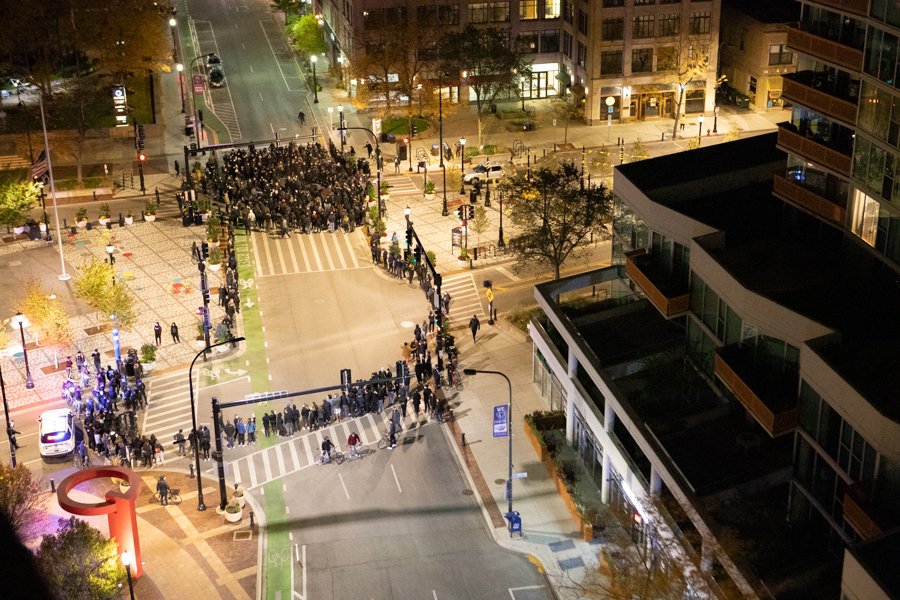Northwestern forms new Community Safety Advisory Board chaired by Prof. Clyde Yancy
Evan Robinson-Johnson/Daily Senior Staffer
Students led by NU Community Not Cops gathered at Fountain Square in October demanding the abolition of University Police.
November 13, 2020
Northwestern is forming a new Community Safety Advisory Board in response to recent advocacy globally and at NU to rethink policing. The board will meet monthly and Feinberg Prof. Clyde Yancy will serve as chair.
Specific responsibilities of the board will include providing recommendations and analysis to central administration regarding campus safety, with input from community members as well as an external review of University Police. Membership will include faculty, staff and students with representation from community members of marginalized identities.
“What I can do as chair is establish a culture for the board,” Yancy said. “A culture that is about listening, that is about being thoughtful and that is about being intentional.”
Yancy, vice dean for diversity and inclusion at Feinberg, has been actively involved in increasing diversity and representation in medicine and at Feinberg. He has spent his career studying health disparities with “bias, inequitable policies and systemic racism” at the core, according to a news release.
Yancy said his understanding of the “root causes” of inequities through a medicinal lens will help him lead the committee in conducting a review that is based on critical listening and methods-based evaluations of best practices. Yancy said he hopes to bring in any voices interested in joining the conversation.
Schapiro announced the creation of the board in an Oct. 27 email after recent campus advocacy, including daily actions from NU Community Not Cops and mass criticism to an Oct. 19 email from Schapiro condemning student protesting.
Alongside the advisory board, Schapiro announced several additional steps taken to address including “Campus Conversations,” a series of six dialogues on public safety and equity; ongoing dialogue with NUCNC, the Black Alumni Association and through the ongoing ASG-moderated Community Dialogues; and anti-racism training senior leadership has already completed.
A UP advisory board was created in 2008 in response to allegations of racial profiling within the department. The board met for the first time in Nov. 2009, and although UP chief Bruce Lewis said in June the committee meets twice per year, several student groups allegedly on the committee said they did not know they were on the committee and meetings do not happen regularly, according to previous reporting by The Daily.
Members of the NU community, including NUCNC, have expressed frustration with the University’s repeated reliance on advisory boards and trainings to solve problems. As the University continues to signal reform efforts, the central demand of the group remains abolition — a goal that is mutually exclusive from reform.
During a Thursday Zoom talk, activist and scholar Angela Davis spoke to NU community members, extending support for students’ efforts and calling reform efforts “the glue that holds the institutions together” — meaning they are at the antithesis of real change.
While Schapiro said in his Oct. 19 email that the University had “absolutely no intention” to abolish UP, Yancy said he hopes to approach the process with a “clean slate” and no preconceived notions about what is possible.
“If we say what is or what isn’t on the table, we’ve just compromised the process,” Yancy said. “I really want to start from ground zero and understand exactly the science behind their position, the data behind their position, their concepts of what constitutes a best environment.”
Meanwhile, Yancy said he hears students’ frustrations and while he cannot promise a perfect outcome, he is committed to a new way forward.
“I have been involved in leadership for over 20 years, and I’ve seen many advisory boards, committee structures, pro consultancies, result in a null effect,” he said. “I’m not guaranteeing success, but I am promising that I will take a very different approach.”
Email: [email protected]
Twitter: @binahschatsky
Related Stories:
— President Schapiro promises UP budgetary review by Nov. 16, dialogue and change on police reform


